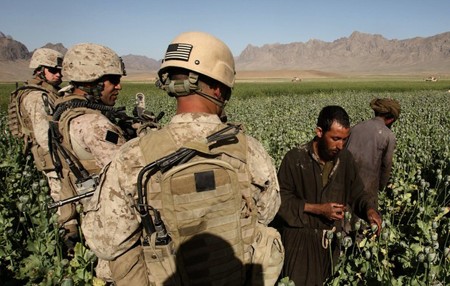By TOM LASSETER
KANDAHAR, Afghanistan — The Pul-I-Charki prison rises out of the dirt fields and mud walls on the edge of east Kabul like a medieval fortress, its castle towers surrounded by checkpoints and machine gun nests.

U.S Marines patrol as Afghan men harvest opium in a poppy field in a village in Golestan district of Farah province, May 5, 2009.
The prison is meant to hold some of Afghanistan's worst criminals, those who officials fear would buy or fight their way out of provincial jails. However, when a reporter asked to interview big-time drug dealers being held there, especially from Helmand or Kandahar, prison officials said they had none.
Sitting behind his desk in a small bungalow building at the prison, Brig. Gen. Ghulam Dastagir Mayar said there was a simple explanation: Influential traffickers in the south have the money to pay police and prosecutors, but the petty dealers and drug runners don't.
Mayar paused for a moment and said there were "high-ranking officials" involved with drugs but that he didn't care to name them.
"The former police chiefs, governors and intelligence chiefs of Helmand own 10 big buildings each, and I, a general, am living in a rented house," he said, his face cinching into a frown.
Around the corner from Mayar's office, a guard went inside Cell Block No. 2 and found a man named Nematullah, who like many Afghans uses only one name. The 22-year-old was in the front seat of an old Russian Kamaz truck last August, rumbling across the desert between Helmand and Nimruz provinces, when he and two other men were arrested. There were more than 2 tons of opium - some 4,400 pounds - hidden in sacks beneath fuel barrels in the back of the vehicle.
However, no one at Pul-I-Charki treated Nematullah as if he were anything other than a farmhand from the countryside; he was brought out with no shackles and left in a room alone with a reporter and translator.
Nematullah said that when he was held in Helmand a prosecutor told him that for 200,000 afghani - about $4,000 - he'd be sure that his case was dismissed in Kabul. But Nematullah didn't have the cash.
During his interrogations and trial in Kabul - where he'd been transferred to a special narcotics court system - officials didn't seem interested in finding out who owned the drugs in the truck, Nematullah said.
It didn't surprise him. In his home district of Musa Qala, an infamous Taliban redoubt in Helmand, "the district chief and the police chief tell their men to protect the water that goes to the poppy fields, to make sure it doesn't go to other crops," he said. "Then at the time of harvest, they receive their share."
That, he said, is how things work in southern Afghanistan.



